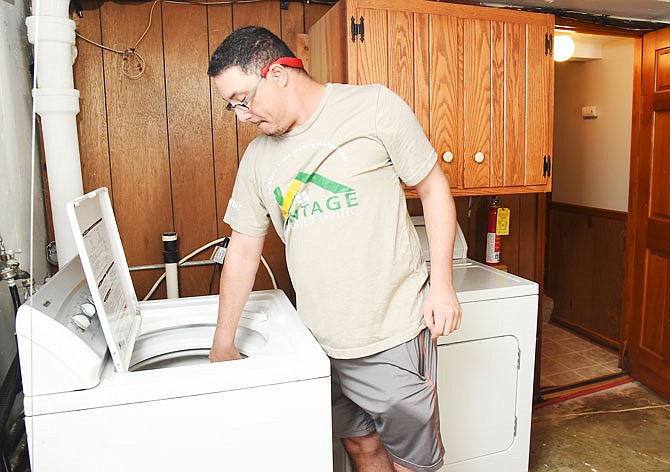A new program in Jefferson City will allow adults with developmental disabilities to lead a more independent life - with a little bit of help.
Vantage Supported Living was founded by Tiffany Burns, who also serves as the executive director of Day Solutions, a day program for adults with developmental disabilities.
According to the Centers for Disease Control and Prevention, 22.4 percent of adults in Missouri have some type of disability, with 7.3 percent having difficulty with independent living.
The new business will provide in-home staff to clients in order to allow them to live independently.
Burns said she'd been considering the idea of forming an individualized supported living business for several years and finally started the process in September.
"We wanted to make sure that when we decided to make that move, we did it with the exact same reputations, expectations and raising of the bar that we have for our other programs," she said.
In May, after a long application process, they received their license and credentials from the Department of Mental Health. On Aug. 1, they took on their first clients - 20-year roommates George and Chris, who had previously been with another provider.
Burns hopes to open a second house by the end of the month, and a third in September, but she doesn't want to grow too fast so they can keep offering good services to their clients.
Compared to options like group homes or nursing homes, individualized supported living homes provide the most independence to people with developmental disabilities while still providing support, Burns said.
ISLs fall under the Department of Mental Health; however, they're funded through comprehensive waivers, which individuals can receive if they are eligible for Medicaid - which in Missouri, comes through an agency called MO HealthNet, a division of the Department of Social Services.
To be eligible for the waiver, clients must also be determined to have a developmental disability and require a certain level of care.
As she was setting up her company, Burns said she interviewed other providers, direct care staff members, clients and their families, to figure out what worked and what didn't.
What she came up with is a direct care solution that allows clients to be as independent as they can.
"We are the closest that clients with developmental disabilities have to becoming independent," Burns said. "It's our job to provide them with services that not only assist them with becoming independent, but really teach them the things that they need to learn in order to take that final step."
Burns said full independence is the ultimate goal, but some will never reach that step. However, Vantage Supported Living will allow them to learn what they can.
"We're not just staffing, it's not a babysitter that sits in the house," she said. "We teach them about money management, about cooking. We teach them about safety. We teach them about appropriate social skills."
For most clients, Vantage will provide 24/7 support, although that can be altered to fit each client. For example, if some of them spend the daytime hours at Day Solutions, they won't need a daytime staff.
The homes are run by the clients, not the care providers, Burns said. There are no schedules or menus - the client makes the decisions, and the care provider is there to serve them.
"You're a grown adult. If you want a cheeseburger tonight, and that's in your budget and you have it in the fridge, the staff will make you a cheeseburger," Burns said.
Unlike many other ISLs, Vantage will not own any properties that their clients live in. Some ISLs are set up where the company owns apartments or houses, and they place the clients there.
Vantage will help clients find homes they choose, Burns said, to help further their feeling of independence, then they will assist with the leasing. But Burns was clear the clients will be the ones on the lease, not the company.
However, the business will be paying a third of the rent at each property. Each house will have three bedrooms - two for the two clients and one extra bedroom to serve as an office and sleeping space for the care providers, complete with a computer and a futon, provided by the company.
Burns said most ISLs operate by owning their own properties because it can be difficult for some landlords and property owners to understand how developmentally disabled people can rent from them.
"I really don't think it's that people aren't willing to rent to individuals with developmental disabilities, I think it's that nobody has taken the time to really educate landlords and homeowners about what the rules are and what it means," she said.
For Burns, starting an ISL wasn't just about providing good service to clients but also providing a good place to work for care providers.
"My goal ultimately for this industry and the reason I took it on, is that day-in and day-out what I was seeing, and what was happening, was this tremendously high turnover rate for staff," she said.
Another goal for Burns is to educate families about the benefits of an ISL, to show them it's good for their family member to have independence, something she knows personally from growing up with an uncle with developmental disabilities.
"It's not about pawning them off on somebody, which is every family member's fear," Burns said. "It's about educating them to see that it's good for (the client), and it's good for you. You're allowing them to do what adults do and live on their own."
She said the Department of Mental Health is encouraging the growth of ISLs, to promote growth and independence over traditionally restrictive environments.
Similar programs in the area include Missouri Mentor, Finck Supported Living Services, ResCare Human Services, Fidelis Support Services and Palmer's Home Care.

